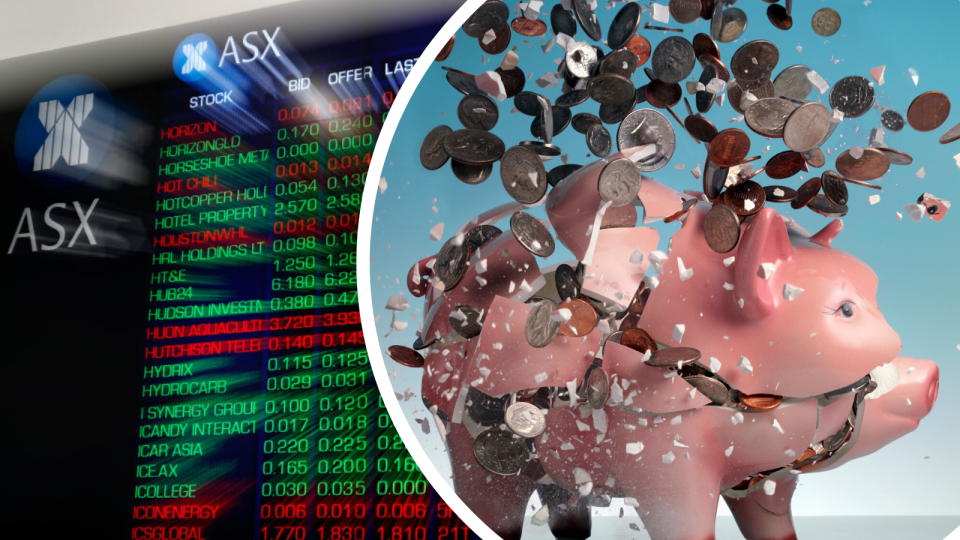Here’s what coronavirus has done to your super: and here’s what to do

The share market has been absolutely thumped over the past couple of months.
We’re talking losses between 30 and 40 per cent during the worst of it. Despite rallies within the bear market, there’s every expectation the market will fall further.
The 1987 stock market crash and the recession that followed saw peak to trough declines of 60+ per cent. The global financial crisis saw the market fall a little over 50 per cent.
We’re not in that sort of territory yet, but we’re not far away either.
Unfortunately, your superannuation is on the line. So, what does this all mean for you?
Here are some answers to some big super questions.
More from Dave Taylor: How long will the stock market take to bounce back after coronavirus?
More from Dave Taylor: How to cope with fear, panic during coronavirus pandemic
More from Dave Taylor: What could be worse than a recession? We could be about to find out
What to do if you’re about to retire during the coronavirus period
Those in or approaching retirement are the most nervous about their superannuation nest eggs right now.
They’re facing a big cut to their income and the time they were expecting to go onto the Age Pension has now been brought forward.
It’s pretty grim.
The ‘advice’ I’ve received from countless analysts and economists as I’ve covered this crisis is “talk to your advisor” and don’t make a knee-jerk emotionally charged decision.
I know that’s hardly concrete, but it is sensible advice. Whatever your long-term strategy is, say investment advisors, stick to it. If you have cash flow problems, you may need to sell assets to meet day-to-day bills, but don’t make any quick irrational decisions.
Can I access my super if I lose my job because of coronavirus?
Those who have lost their jobs recently may feel the lack of cash flow quite acutely.
In an attempt to help them, the government is allowing Australians affected by the coronavirus to access up to $10,000 of their superannuation in 2019-20 and a further $10,000 in 2020-21.
The first $10,000 is available between mid-April and 1 July 2020, and the second $10,000 is available after 1 July 2020 for around three months.
What to do if you are still worried about market volatility because of coronavirus?
Let’s face it, the old cliché of a market roller coaster ride is now perfectly credible.
There have been days when the market has begun the day deeply in the red, only to finish well into positive territory, and vice-versa.
There’s a simple rule here: if you are not a highly experienced day trader, stay the heck away from the market.
You wouldn’t go into wild seas if you weren’t a professional sailor, so why would you go into a wild share market without an enormous level of experience? You wouldn’t.
How super can help you during the coronavirus crisis
Over time, the share market rises. This economic hit feels like it’s going to be with us forever, but it won’t be.
Eventually the pandemic will subside, economies will recover, as will financial markets and companies.
The British say, ‘keep calm and carry on’, and that’s not a bad way of putting it. If you’re young, superannuation is still a sound long-term investment. Indeed once the market does start recovering sustainably, it will create once-in-a-generation wealth creating opportunities.
How much has coronavirus cost the average super account
The following figures come from investment firm, Stockspot:
Global equities were valued at $12bn in January. Since then the developed market index has declined 30 per cent and the emerging market index has declined 25 per cent. If the Hostplus portfolio tracked these performances it is now worth around $8.5bn.
Australian shares in the flagship Hostplus Balanced fund were valued at $11bn at the end of January. If they tracked the 38 per cent fall in the index they would be worth around $7.5bn now.
Hostplus boasts of having 1.2 million members with an average balance of $37,000. Many of these members work, or rather used to work, in the hospitality, tourism, recreation and sport sectors.
It is a fair assumption that most of these members are invested in the default Balanced fund. If 1 million members take advantage of the $20,000 super withdrawal window there could be $20bn walking out of this fund.
The bottom line
Australia’s super industry was worth a staggering $3 trillion earlier this year. It’s now significantly less than that.
For some that will cause some pain, but you shouldn’t let that pain lead to poor decision making.
For others, by being sensible, and waiting on the shoreline for the storm to pass, you could be setting yourself for brand new opportunities – notwithstanding the need for a lot of patience in the meantime.
@DaveTaylorNews
Make your money work with Yahoo Finance’s daily newsletter. Sign up here and stay on top of the latest money, news and tech news.
Follow Yahoo Finance Australia on Facebook, Twitter, Instagram and LinkedIn.

 Yahoo Finance
Yahoo Finance 